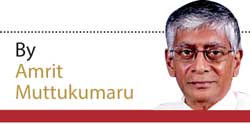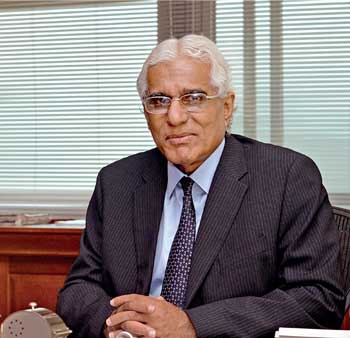Reply To:
Name - Reply Comment
 I dare say Sri Lanka has earned the dubious distinction to be listed by the European Union as a ‘high risk country for money laundering’ subsequent to the ‘Financial Action Task Force’ (FATF) placing the country on its ‘grey list’ reportedly from November 2017. Dr. Indrajit Coomaraswamy who assumed office as CBSL Governor from July 3, 2016 must bear some responsibility. The chequered response of the CBSL particularly in recent times to its regulatory obligations has no doubt aided this outcome.
I dare say Sri Lanka has earned the dubious distinction to be listed by the European Union as a ‘high risk country for money laundering’ subsequent to the ‘Financial Action Task Force’ (FATF) placing the country on its ‘grey list’ reportedly from November 2017. Dr. Indrajit Coomaraswamy who assumed office as CBSL Governor from July 3, 2016 must bear some responsibility. The chequered response of the CBSL particularly in recent times to its regulatory obligations has no doubt aided this outcome.
Discerning visitors to Sri Lanka have commented on the mismatch on the one hand of a country with a weak economy and infrastructure bending over backwards for FDIs and financial assistance from multi-lateral agencies and on the other the swanky high-rise apartments and fancy restaurants dotting the city of Colombo with high-end vehicles which would do even a first world country in Europe proud.
Crucial issues of governance incidental to the egregious bond scam thrown up by witnesses at the Presidential Commission of Inquiry (PCoI) probing the issuance of Treasury Bonds by the CBSL which include possible tax evasion, money laundering and bank malpractice are not even on the radar of the CBSL. The only exception is the ‘suspension’ of Pan Asia Bank (PABC) in relation to its ‘primary dealer’ activities.
Money Laundering / Tax Evasion?
 What action has CBSL taken in relation to:
What action has CBSL taken in relation to:
1) Kaushitha Rathnaveera, a Senior Dealer of PTL (Perpetual Treasuries Limited) disclosing to the PCoI that “millions” encashed by him were “several times” left on “PTL’s CEO Kasun Palisena’s chair”.
Nuwan Salgado, Chief Dealer of PTL disclosing to the PCoI that on the “instructions of PTL’s CEO Kasun Palisena” he maintained a record of payments to “informants” code named as ‘Charlie’, ‘Tango’ and others.
2) B. R. Sinniah, Chief Financial Officer of GTLPL (Global Transportation and Logistics [Pvt] Ltd) said to be controlled by former Finance Minister Ravi Karunanayake’s family in his testimony to the PCoI disclosing:
“Chairman ‘Lakshmi Kanthan’ who resides in Britain had arrived at the Company on two occasions in February 2016 and 2017 and dumped cash amounting to Rs.145 million in the Chairman’s safe”. “It had not been supported by any documentation or receipt issued to Lakshmi Kanthan neither were there any entries in the GTLPL accounts books regarding these two cash inflows”
3) B. R. Sinniah also telling the PCoI: “The Rs.145 million used in making the initial payment of Rs.16.5 million and thereafter to pay the monthly loan installment of Rs.11 million” for the purchase of the ‘Monarch’ Penthouse in Colombo by a company owned by the then Minister Ravi Karunanayake’s family “has no origin nor has it been accounted for”. Should these not concern the CBSL and the Inland Revenue Department?
PEPs as Bank Directors
Politically Exposed Persons (PEPs) are at the centre of the worldwide efforts for the prevention of money laundering.
The CBSL consistent with international best practice defines PEPs as:
“PEPs are defined as “individuals in Sri Lanka or abroad who are, or have been, entrusted with prominent public functions” e.g. Heads of State or of government, senior politicians, senior government, judicial or military officials, senior executives of State-owned corporations, important political party officials. Business relationships with family members or close associates of PEPs involve reputation risks similar to those with PEPs themselves.”
1) Based on this definition it is not difficult to discern there are prominent PEPs in Sri Lanka who are currently ‘directors’ of banks. One such person is a ‘man for all seasons’ under successive administrations who is a frequent writer on governance. Others include a banking sector regulator and a senior member of the judiciary who became bank directors soon after retirement.
2) When even the mere “Opening of accounts” in banks by PEPs is under scrutiny in Sri Lanka, how could the Director of Bank Supervision advise me there is “no restriction for appointments of PEPs as Board members of licensed banks”.
The Central Bank laboured for almost a month to give me this untenable response subsequent to my e-mail of July 5, 2017 to Dr. Coomaraswamy.
It must be flagged that although all PEPs are not involved in money laundering or unlawful activities, the high risk they pose cannot be ignored. Laws and guidelines are there for a purpose and must be adhered to.
3) It was revealed at the Bond Commission that B.R. Sinniah was “appointed to the Board of Directors of the BoC in 2015 by the then Finance Minister Ravi Karunanayake for a period of one year”.
This demonstrates the hopeless situation in Sri Lanka when the Finance Minister himself appoints the Chief Financial Officer of his family-controlled company to the Board of Directors of the Bank of Ceylon.
Ravi Karunanayake being a PEP is a no-brainer. B.R. Sinniah too is clearly a PEP as per the CBSL definition which is consistent with international best practice. Under no circumstances is it suggested that Ravi Karunanayake, B.R. Sinniah or all PEPs are engaged in unlawful activities. Nevertheless, the high risk PEPs pose cannot be ignored.
Although B.R. Sinniah had presumably ceased being a bank director when Dr. Coomaraswamy assumed the position of CBSL governor, the fact of the matter is that under his watch too there are PEPs who are bank directors.
4) During the tenure of former CBSL Governor - Ajith Nivard Cabraal, his sister Shiromi Wickramasinghe - clearly a PEP - was a bank ‘Director’ which included being Chairman of ‘State owned’ entity HDFC Bank (Housing Development Finance Corporation). The CBSL is continuing to turn a blind eye to its own guidelines and laws.
SL has earned the dubious distinction to be listed by the EU as a ‘high risk country for money laundering’
Bank Malpractice?
1) A gaping hole in the PCoI report is the ‘pussyfooting’ on the Bank of Ceylon giving PTL access to billions of rupees almost instantly which enabled PTL with the aid of “inside information” to make a ‘killing’ in the secondary Bond market at the further expense of state institutions which include the hard-earned savings of workers in the EPF.
2) The PCoI report states that at a meeting “convened” on March 28, 2016 by Ravi Karunanayake the then Minister of Finance “three State Banks had been instructed to place Bids within a specified range of Yield Rates at the Treasury Bond Auction to be held on March 29, 2016 and that, the three State Banks had been given an assurance that, Bids at higher Yield Rates would not be accepted at this Auction.”
The State banks concerned:- Bank of Ceylon, People’s Bank and National Savings Bank - adhering to these ‘instructions’ had significantly benefited PTL financially and resulted in an ‘opportunity loss’ to the state banks.
3) It was also revealed at the PCoI that Saman Kumara, the then dealer for the EPF at the CBSL, had allegedly received a personal loan of Rs. 25 million from PABC when Nimal Perera was Chairman. It is relevant to ascertain whether this loan and its settlement (if any) took place in the ordinary course of banking practice or whether any special privileges were afforded.
4) Although it was the EPF that by far suffered the major loss due to purchases of Treasury Bonds in the secondary market from PTL, another non-bank financial institution that reportedly took a substantial hit was the Sri Lanka Insurance Corporation (SLIC).
Should these not be of interest to CBSL’s ‘Bank Supervision’ and ‘Non-Bank Supervision’ Departments?
Tax Evasion in ‘Leading Bank’?
After the damning allegations in a website of an alleged tax evasion in a leading bank was brought to the attention of CBSL Governor, Dr. Indrajit Coomaraswamy on September 25, 2017, it took the CBSL 42 days to advise me (i) “CBSL has not carried out any investigations” (ii) “the statements” in the article “are factually incorrect” (iii) “The matter is being brought to the attention of the Inland Revenue Department.”
The allegations include:-
i) Some portion of the “evaded tax” was “divided between the tax advising company and the officers at the Inland Revenue Department involved”
It begs the questions:1) How “the statements” contained in the article “are factually incorrect” if “CBSL has not carried out any investigations”?
ii) “The current Chairperson of the Bank Rani Jayamaha has also been able to identify the wrongdoing through an internal probe” (since then there is another chairperson)
2) Why it has taken CBSL 42 days (from my initial e-mail of September 25) to belatedly state “The matter is being brought to the attention of the Inland Revenue Department.”?
3) Has CBSL brought it “to the attention of the Inland Revenue Department” even now? If not why?
Much was expected from incumbent CBSL Governor Dr. Coomaraswamy who has been in the saddle for 20 months.
Whether CBSL has investigated the legitimacy of the Sri Lankan accounts in the ‘Panama Papers’?
Conclusion
In the context of the foregoing – particularly the absence of the political will to enforce existing laws and regulations on a level playing field, it is downright dangerous to have in the statute book the recently enacted ‘Foreign Exchange Act, No. 12 of 2017’ which further liberalizes foreign exchange transactions which in effect is conducive for money laundering if people are so inclined. The Act inter alia states “The Central Bank shall as the agent of the Government, be responsible for implementing the provisions of this Act”.
One would have expected Dr. Coomaraswamy at the very least to have publicly cautioned the government against the enactment of such an Act.
Do these not have implications for the integrity of the proposed ‘Colombo International Financial City’? Dr. Coomaraswamy has also failed to respond to the questions posed to him in my e-mail of August 30, 2017 in regard to Sri Lankan citizens allegedly linked to offshore companies in tax havens revealed in the ‘Panama Papers’ which include:
“Whether the CBSL has investigated the legitimacy of the Sri Lankan accounts in the ‘Panama Papers’?” One of the persons named – a prominent corporate personality who was a colleague of the CBSL Governor is also Chairman of a Bank.
The writer is not suggesting or implying that the mere listing of names and entities in tax havens is indicative of wrongdoing. Nevertheless it is incumbent on the CBSL to ascertain legitimacy. Tardiness on the part of CBSL does injustice to those who have legitimate accounts.
The CBSL which was at the centre of the egregious Bond Scam (prior to Dr. Coomaraswamy assuming office) definitely requires a thorough clean-up. Will this convincingly happen?
The tragedy is that the alternative to the Yahapalana government is also disconcerting unless there is a radical course correction.